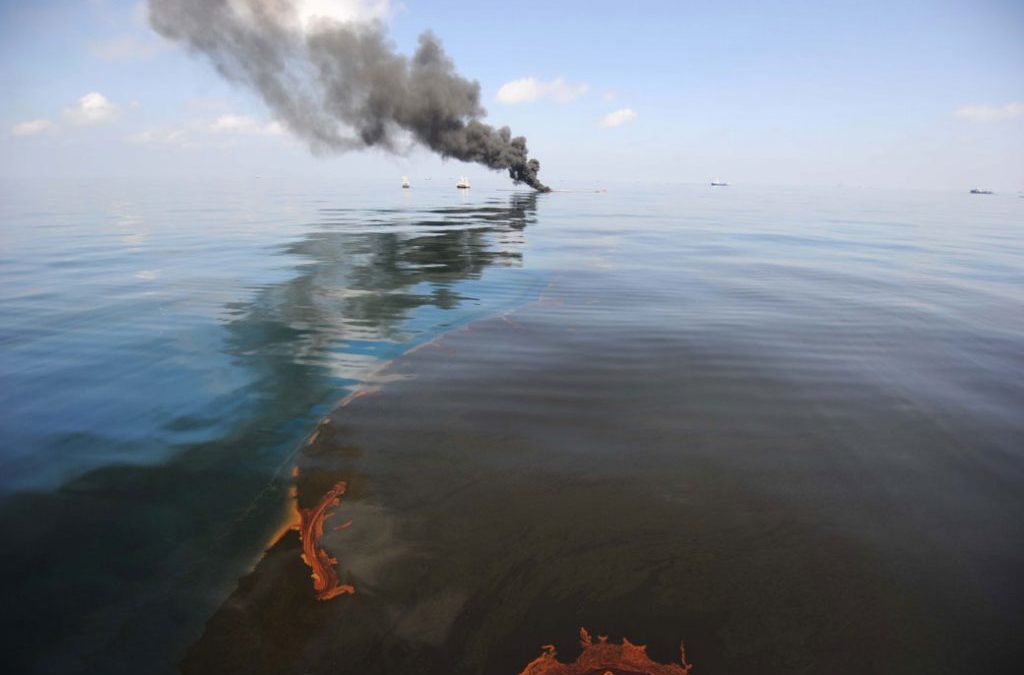SOURCE: American Progress
DATE: March 3, 2020
SNIP: On April 20, 2010, an explosion and fire on the offshore drilling rig Deepwater Horizon killed 11 men and injured 17 other crew members. Over the next 87 days, an estimated 210 million gallons of oil spilled into the Gulf of Mexico, poisoning fish and wildlife, forcing the closure of beaches and fisheries, and causing billions of dollars in damage to coastal communities along the Gulf.
After this catastrophic spill, the Obama administration enacted a series of reforms to improve oil rig safety—reforms that the Trump administration has since rolled back. A Center for American Progress review of government data finds that oil spills, injuries, and accidents from offshore drilling are now on the rise, threatening to erase the progress made in the 10 years since the Deepwater Horizon disaster.
In late 2017 and 2018, at the direction of an executive order signed by President Donald Trump, the U.S. Department of the Interior began to loosen its oversight of drilling and to weaken safety standards that the Obama administration implemented in response to Deepwater Horizon.
During its first months, the Trump administration placed the Bureau of Safety and Environmental Enforcement (BSEE)—an agency created after Deepwater Horizon to regulate offshore drilling—under the leadership of Scott Angelle, a former Louisiana secretary of natural resources who served for years on the board of an oil and gas pipeline company. During the Obama administration, Angelle helped lead the oil and gas industry’s fight against reforms to offshore drilling safety.
Following Angelle’s arrival in 2017, the number of inspections and enforcement actions undertaken by BSEE declined. According to agency data, BSEE inspectors conducted 13 percent fewer inspection visits to rigs, platforms, pipelines, and other facilities in the first three years of the Trump administration (2017–2019) than they did during the last three years of the Obama administration (2014–2016).
[A]gency data also show that BSEE inspectors took 38 percent fewer enforcement actions—through the issuance of so-called incidents of noncompliance—against offshore oil and gas operators from 2017 to 2019 than they did from 2014 to 2016. It is difficult to explain this precipitous decline in enforcement actions with a theory that oil and gas companies suddenly awakened to the merits of voluntary compliance with safety guidelines.
Furthermore, a Politico investigation found that BSEE granted nearly 1,700 waivers that allowed companies to sidestep compliance with stronger safety standards for blowout preventers—a critical piece of safety equipment that can serve as a last line of defense against well blowouts, oil spills, and other disasters.
On December 7, 2017, the Trump administration abruptly canceled a National Academies of Sciences, Engineering, and Medicine study that aimed to improve how BSEE conducts offshore oil and gas inspections.
Days later, the agency released a proposed rule to weaken oversight and safety procedures for offshore oil and gas production facilities, reversing reforms that were implemented after Deepwater Horizon. Then, in May 2018, Angelle’s BSEE issued a proposal to weaken blowout preventer and well control standards—standards that had been written based on the lessons learned from the mechanical, human, and systemic failures that led to Deepwater Horizon.
With safety standards weakened and inspections and enforcement actions on the decline, oil spills and injuries from offshore drilling have been rising.

